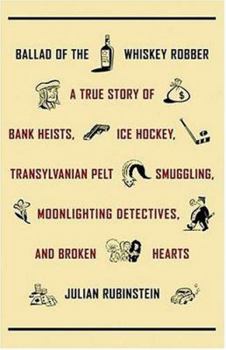Ballad of the Whiskey Robber: A True Story of Bank Heists, Ice Hockey, Transylvanian Pelt Smuggling, Moonlighting Detectives, and Broken Hearts
Select Format
Select Condition 
Book Overview
Attila Ambrus was a gentleman thief from Transylvania, a terrible professional hockey goalkeeper - and preferred women in leopard-skin hot pants. During the 1990s, while playing for the biggest hockey team in Budapest, Ambrus took up bank robbery to make ends meet. Arrayed against him was perhaps the most incompetent team of crime investigators the Eastern Bloc had ever seen: a robbery chief who had learned how to be a detective by watching dubbed...
Customer Reviews
Miracle of Nonfiction Reporting Turned into Novel Suspense
Even with my anticipation it did not disappoint!
Cops and Robbers of the Absurd
great book!
A funny account of horrible times.
Ballad of the Whiskey Robber: A True Story of Bank Heists, Ice Hockey, Transylvanian Pelt Smuggling, Moonlighting Detectives, and Broken Hearts Mentions in Our Blog

Thirty years ago, two men entered Boston's Isabella Gardner Museum in the wee hours of the morning. They left with thirteen works of art valued at more than $500 million. The case—the largest art robbery in US history—remains unsolved. Here we offer fascinating accounts of the world's most notorious heists.





